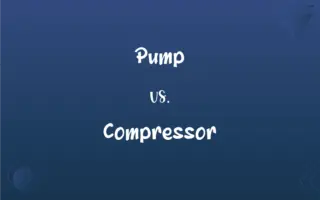Sensors vs. Actuators: What's the Difference?
Edited by Aimie Carlson || By Harlon Moss || Published on February 12, 2024
Sensors detect or measure physical properties, while actuators convert signals into physical movement.

Key Differences
Sensors are devices that detect changes in the environment, such as temperature, light, or pressure, and convert these into readable signals. Actuators, in contrast, receive signals and convert them into physical action, like moving a robotic arm or opening a valve.
The functionality of sensors lies in their ability to accurately sense and transmit data about their surroundings. Actuators, however, focus on executing a task based on the input they receive, which could be from sensors or control systems.
Sensors play a crucial role in gathering information, which is essential for systems that rely on accurate environmental data. Actuators use this data to perform physical tasks, thereby turning digital information into mechanical motion.
In many systems, sensors serve as the input devices, constantly monitoring and relaying data. Actuators act as the output devices, responding to these inputs with appropriate actions.
The integration of sensors and actuators is vital in automated systems. Sensors provide the necessary information for the system to understand its environment, while actuators carry out the system's response to this information.
ADVERTISEMENT
Comparison Chart
Function
Detect and measure conditions
Execute actions based on signals
Role in a System
Input devices
Output devices
Type of Output
Electrical signal
Physical movement or action
Dependency
Independent in sensing
Dependent on input signals
Example Applications
Temperature sensors in thermostats
Motors in robotic arms
ADVERTISEMENT
Sensors and Actuators Definitions
Sensors
A sensor is a device that detects physical quantities.
The light sensor automatically adjusted the screen's brightness.
Actuators
An actuator is a device that creates physical movement.
The actuator in the robot arm grasped the object.
Sensors
Sensors measure specific environmental data.
The temperature sensor triggered the alarm as the room heated up.
Actuators
Actuators convert control signals into mechanical motion.
The valve actuator opened in response to the temperature rise.
Sensors
Sensors convert physical stimuli into electrical signals.
The motion sensor activated the lights in the hallway.
Actuators
Actuators perform actions in mechanical systems.
The hydraulic actuator lifted the heavy machinery.
Sensors
Sensors are used for data collection in various devices.
The smartphone's sensor detected the user's fingerprint for authentication.
Actuators
Actuators are key components in automation.
The electric actuator adjusted the position of the solar panel.
Sensors
Sensors monitor changes in physical properties.
The pressure sensor indicated a drop in the tire's air pressure.
Actuators
Actuators execute tasks based on received signals.
The linear actuator extended the platform as programmed.
Sensors
A device, such as a photoelectric cell, that receives and responds to a signal or stimulus.
Actuators
One that activates, especially a device responsible for actuating a mechanical device, such as one connected to a computer by a sensor link.
Sensors
See sense organ.
Actuators
Plural of actuator
Sensors
Plural of sensor
FAQs
What is an actuator?
A device that converts control signals into mechanical action.
What is a sensor?
A device that detects and measures environmental conditions.
How do sensors work?
By converting physical stimuli into readable electrical signals.
How do sensors impact automation?
They provide critical data for automated decision-making.
Can sensors work independently?
Yes, sensors can independently sense and transmit data.
What are common types of sensors?
Temperature, pressure, and light sensors are common types.
Are actuators essential in robotics?
Yes, they are key for movement and operation in robotics.
What is the primary function of an actuator?
To create physical movement based on input signals.
Do actuators require a control signal to operate?
Yes, actuators need input signals to initiate action.
Do sensors require maintenance?
Regular calibration and maintenance are often necessary.
What are typical applications for actuators?
Robotics, machinery control, and vehicle systems use actuators.
What powers actuators?
Electric, hydraulic, or pneumatic power sources.
What determines an actuator's strength?
Its design, power source, and construction materials.
Can actuators work in harsh environments?
Yes, if designed for specific environmental conditions.
Can sensors detect motion?
Yes, motion sensors detect and respond to movement.
How do sensors communicate data?
Through electrical signals sent to a control system.
Are all sensors digital?
No, sensors can be analog or digital.
Can actuators be used for precision tasks?
Yes, especially in applications like surgery or fine assembly.
What innovations are emerging in sensor technology?
Advances in miniaturization, accuracy, and connectivity.
Are there new trends in actuator design?
Trends include increased efficiency, compactness, and versatility.
About Author
Written by
Harlon MossHarlon is a seasoned quality moderator and accomplished content writer for Difference Wiki. An alumnus of the prestigious University of California, he earned his degree in Computer Science. Leveraging his academic background, Harlon brings a meticulous and informed perspective to his work, ensuring content accuracy and excellence.
Edited by
Aimie CarlsonAimie Carlson, holding a master's degree in English literature, is a fervent English language enthusiast. She lends her writing talents to Difference Wiki, a prominent website that specializes in comparisons, offering readers insightful analyses that both captivate and inform.






































































